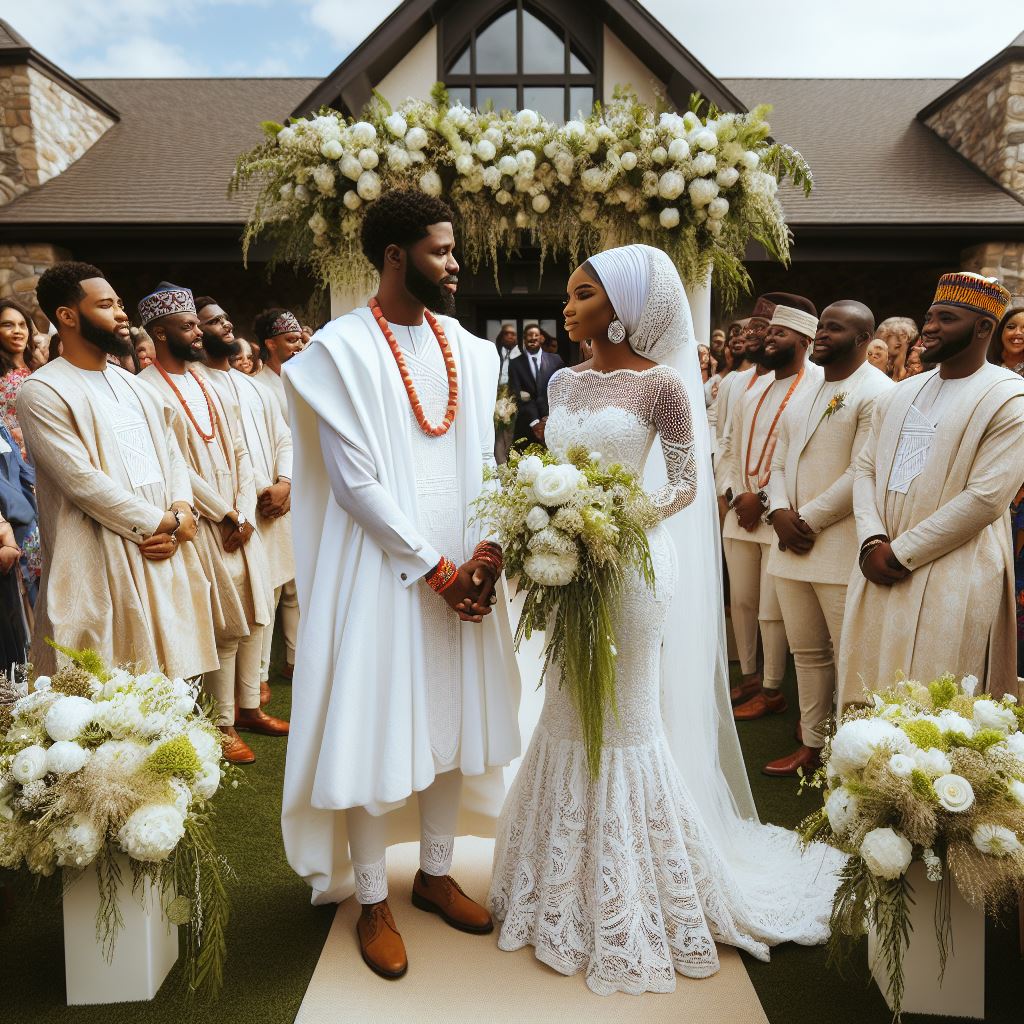Introduction
Importance of green card through marriage for Nigerian citizens
A green card through marriage is of great importance for Nigerian citizens looking to establish permanent residency in the United States, unlocking opportunities for a better future.
Purpose of the blog post and the information it will cover
- This blog post aims to provide a comprehensive guide on the process, requirements, and benefits of obtaining a green card through marriage.
- By providing this comprehensive guide, we empower Nigerian citizens to navigate the complexities of obtaining a green card through marriage successfully.
- The post aims to demystify the intricate process, covering key aspects such as eligibility criteria, documentation requirements, interview preparation, the adjudication process, nuances of conditional green cards, and the invaluable role of legal assistance and immigration attorneys.
- By equipping Nigerian citizens with this knowledge, the blog post empowers them to navigate the complexities of the green card application process with confidence and clarity, ensuring a smoother and more informed pursuit of their American dream.
Understanding the Green Card
What a green card is and its significance
- A green card, officially known as a Permanent Resident Card, allows foreign nationals to live and work permanently in the United States.
- It serves as proof of legal immigration status and provides numerous benefits and opportunities for the cardholder.
- A green card holder becomes a lawful permanent resident of the United States, with rights similar to those of a U.S. citizen.
Benefits and rights associated with holding a green card
Obtaining a green card through marriage to a U.S. citizen offers several valuable benefits and rights:
- Immigration Status: The green card provides permanent residency and allows the individual to live and work in the U.S. without time limitations.
- Employment Opportunities: Green card holders have the right to work in any job or profession in the U.S., except for certain government positions.
- Education: They can attend public schools and universities, receiving the same opportunities as U.S. citizens.
- Social Security Benefits: Green card holders may be eligible for certain government benefits, including Social Security and Medicare.
- Travel Flexibility: Green card holders can freely travel in and out of the U.S., as long as they maintain their permanent residency status.
Additional Benefits
- Protection under U.S. Laws: They are entitled to legal protection and can seek assistance from law enforcement agencies if needed.
- Sponsorship for Relatives: Green card holders can sponsor their immediate family members for lawful permanent residency.
- Path to Citizenship: Holding a green card opens the possibility of applying for U.S. citizenship after meeting certain criteria.
- Access to Social Services: They can access various social services, such as healthcare and welfare programs available to residents.
- Tax Benefits: Green card holders are subject to U.S. tax laws and may be eligible for certain tax benefits available to residents.
- Residency Security: A green card provides security, as it ensures that the individual can permanently reside in the U.S. with legal status.
Overall, obtaining a green card through marriage offers Nigerian citizens the opportunity to build a stable and secure life in the United States.
It provides them with the freedom to pursue employment, education, and the ability to reunite with their immediate family members.
Moreover, a green card offers a pathway to U.S. citizenship, further expanding the rights and opportunities available to individuals.
Read: Why Some Nigerians Opt for Destination Marriages in the USA
Eligibility Requirements
Basic Eligibility Criteria for Obtaining a Green Card Through Marriage
To be eligible for a green card through marriage, certain criteria must be met:
- Legal Marriage: The marriage must be legally recognized by the relevant authorities.
- Valid Relationship: The couple must have a genuine, bona fide relationship and intend to live together.
- Sponsor’s Citizenship or Permanent Residency: The sponsoring spouse must be either a U.S. citizen or a lawful permanent resident.
- Age Requirement: Both spouses must be at least 18 years old at the time of filing the application.
- No Fraudulent Intent: The marriage should not have been entered into solely for immigration benefits.
Importance of a Bona Fide Relationship and Required Evidence
A bona fide relationship is crucial in obtaining a green card through marriage. Here’s why:
- Proof of Relationship: The couple needs to provide documentary evidence demonstrating their joint assets, responsibilities, and commitments.
- Interview Process: USCIS often conducts interviews to ensure the relationship is genuine. Evidence must be presented to support the legitimacy of the marriage.
- Marriage Certificate: The official marriage certificate is a fundamental document to prove the legality of the union.
- Financial Support: Demonstrating joint financial responsibilities, such as shared bank accounts or joint tax returns, strengthens the case.
- Affidavits from Family and Friends: Sworn statements from close relatives and friends attesting to the authenticity of the relationship are valuable evidence.
Specific Eligibility Requirements for Nigerian Citizens
Nigerian citizens seeking a green card through marriage must meet additional requirements:
- Multiple Marriages: If the intending spouse has been married previously, they must provide proof of termination of all prior marriages.
- Health Examination: A medical examination conducted by an approved physician in Nigeria is mandatory.
- English Language Proficiency: Demonstrating proficiency in English is required. This can be done through testing or by completing an English language course.
- Criminal Background Check: Nigerian citizens must present police certificates from all countries they have lived in since the age of 16.
Basically, obtaining a green card through marriage requires meeting specific eligibility criteria. The relationship must be genuine, and evidence must be provided to prove its authenticity.
Nigerian citizens have additional requirements to fulfill, such as English language proficiency and criminal background checks.
Understanding these eligibility requirements is essential for a successful green card application process.
Read: Planning a Wedding: Venues and Laws Across US States
Process Overview
Overview of the general process for obtaining a green card through marriage
To obtain a green card through marriage, Nigerian citizens must go through a thorough process that involves several steps. Here is an overview of the general process:
- Determine eligibility: The first step is to ensure that you meet the eligibility requirements for obtaining a green card through marriage. This includes being legally married to a U.S. citizen or permanent resident and proving that the marriage is genuine.
- File the Form I-130: The next step is to file the Form I-130, also known as the Petition for Alien Relative. This form establishes the relationship between the Nigerian citizen and their U.S. citizen or permanent resident spouse.
- Gather supporting documents: Along with the Form I-130, you must provide supporting documents to prove the legitimacy of your marriage. These documents may include copies of marriage certificates, joint bank account statements, lease agreements, and photographs.
Application steps, including filing forms, gathering documents, and paying fees
- Filing Forms: After submitting the Form I-130, the Nigerian citizen must also file the Form I-485, Application to Register Permanent Residence or Adjust Status. This form is used to apply for a green card.
- Biometrics Appointment: Once the forms are submitted, the applicant will receive a notice for a biometrics appointment. At this appointment, fingerprints, photographs, and signatures will be taken for background checks.
- Attend an Interview: The next step is to attend an interview at a U.S. Citizenship and Immigration Services (USCIS) office. During the interview, the couple will be asked questions about their relationship to determine its authenticity.
- Medical Examination: Prior to the interview, the Nigerian citizen will need to undergo a medical examination by a USCIS-approved physician. This examination includes a physical examination, vaccinations, and a review of medical history.
- Submit Additional Documents: In some cases, additional documents may be required to support the marriage. These may include affidavits from friends and family, joint tax returns, and proof of joint ownership of assets.
- Pay Fees: Throughout the process, there are several fees that must be paid. These include filing fees for the various forms, fees for the medical examination, and fees for the biometrics appointment.
Potential challenges or specific considerations for Nigerian citizens
Obtaining a green card through marriage can present certain challenges for Nigerian citizens. These challenges may include:
- Proving the legitimacy of the marriage: Nigerian citizens may face additional scrutiny when proving the authenticity of their marriage. This is due to the prevalence of marriage fraud schemes involving Nigerian nationals.
- Immigration backlogs: Nigerian citizens may experience longer processing times due to visa availability limits and backlogs in the immigration system.
- Cultural differences and language barriers: Adjusting to a new culture and language can be challenging for Nigerian citizens, especially during the interview process.
- Financial considerations: The cost of the application process and associated fees can be a significant burden for Nigerian citizens.
Despite these challenges, with proper preparation and attention to detail, Nigerian citizens can successfully navigate the process of obtaining a green card through marriage.
It is crucial to stay informed about the latest immigration policies and seek legal advice if needed
Read: Name Change After Marriage: USA Norms for Nigerian Couples
Supporting Documentation
Required supporting documents for the green card application
- Marriage Certificate
- Passport Photos
- Proof of Citizenship
- Proof of Termination of Previous Marriages
- Form I-864, Affidavit of Support
- Financial Documents
- Proof of Bona Fide Marriage
- Criminal Record Check
- Medical Examination
- Form I-693, Vaccination Record
Purpose of each document and how to obtain or prepare them
- Marriage Certificate: Official document proving the marriage between the petitioner and the foreign spouse. Obtain it from the registrar of marriages.
- Passport Photos: Recent photos of the petitioner and the foreign spouse, complying with the official specifications.
- Proof of Citizenship: Citizenship documents like birth certificates, naturalization certificates, or passports proving the petitioner’s US citizenship status.
- Proof of Termination of Previous Marriages: Divorce decrees or death certificates to confirm the termination of any previous marriages for both spouses.
- Form I-864, Affidavit of Support: A legal document establishing that the petitioner can financially support the foreign spouse.
- Financial Documents: Tax returns, pay stubs, bank statements, or employment letters demonstrating the petitioner’s financial stability.
- Proof of Bona Fide Marriage: Joint bank accounts, joint lease/mortgage agreements, photographs, or affidavits from family and friends affirming the legitimacy of the marriage.
- Criminal Record Check: Certificates or records from relevant authorities confirming the petitioner’s and foreign spouse’s clean criminal history.
- Medical Examination: A comprehensive medical examination performed by an authorized physician to ensure both spouses meet the health requirements.
- Form I-693, Vaccination Record: A record of the foreign spouse’s vaccination history, provided by the panel physician during the medical examination.
Importance of thorough documentation to avoid delays or denials
- Submitting complete and accurate supporting documents is crucial for a smooth green card application process.
- Incomplete or missing documentation may lead to processing delays or even denial of the application. To avoid such setbacks, double-check each requirement and consult with an immigration attorney if needed.
Keeping organized records and maintaining open communication with immigration officials can ensure a successful application.
Read: Tying the Knot: Differences Between US and Nigerian Ceremonies

Interview Preparation
Possibility of an interview and its role in the green card application process
- An interview is a crucial step in the green card application process.
- It is important to understand that not all applications require an interview.
- The interview serves as an opportunity for immigration officials to verify the legitimacy of the marriage.
- It allows officials to assess the couple’s knowledge and understanding of each other.
- The interview is a means to determine if the marriage is genuine and not solely for obtaining a green card.
- The decision to schedule an interview is at the discretion of the USCIS officer handling the application.
Tips on how to prepare for the interview, including practicing common questions
- Start by thoroughly reviewing your application for accuracy and consistency.
- Familiarize yourself with all the documents submitted, especially those related to your marriage.
- Research and understand the process and requirements for obtaining a green card through marriage.
- Practice answering common interview questions, such as how you met, your daily routines, and future plans.
- Prepare a timeline of your relationship, including important dates and events.
- Practice good communication skills and be confident in expressing your love and commitment to each other.
- Ensure both partners are well-informed about each other’s personal history, background, and family.
- Discuss potential areas of concern or discrepancies with your spouse to be prepared for those questions.
- Consider seeking guidance from an immigration attorney or consultant to ensure thorough preparation.
Importance of honesty and integrity during the interview
- Honesty and integrity are vital during the interview process.
- Providing false information or misleading answers can lead to serious consequences.
- Be truthful and transparent in your responses, even if the question seems challenging or uncomfortable.
- Remember that immigration officers are experienced in detecting fraudulent behavior.
- Consistency in your responses and alignment with the information provided in your application is critical.
- Maintain a respectful and cooperative demeanor throughout the interview.
- If you don’t understand a question, politely request clarification rather than guessing an answer.
- Avoid volunteering excessive information or straying from the interviewer’s questions.
- Be aware that any inconsistencies or discrepancies in your responses can raise doubts about your marriage’s legitimacy.
In summary, the interview is a significant step in the green card application process for Nigerian citizens seeking permanent residency through marriage.
It is essential to prepare thoroughly by reviewing your application, practicing common questions, and understanding the importance of honesty and integrity.
By demonstrating a genuine relationship and providing accurate information, you can increase the chances of a successful interview outcome.
Remember, proper preparation and sincere cooperation are key to navigate this critical stage of the green card application process.
Adjudication and Decision
The Process of Adjudication: USCIS Reviews the Green Card Application
- The adjudication process begins after submitting the green card application to the United States Citizenship and Immigration Services (USCIS).
- During adjudication, USCIS carefully reviews the application to determine its eligibility and adherence to immigration laws.
- USCIS will evaluate supporting documents, conduct background checks, and verify the authenticity of the information provided.
- Adjudicators may request additional evidence or clarification if they find inconsistencies or require more information.
- The thorough examination in the adjudication stage ensures that only qualified individuals receive green cards.
Possible Outcomes: Approval, Denial, or Request for Additional Evidence
- If USCIS approves the application, the foreign spouse will receive a Notice of Approval and can proceed with the green card process.
- On the other hand, USCIS may deny the application if it fails to meet the required criteria or if there are legal grounds for denial.
- In some cases, USCIS may issue a Request for Evidence (RFE) to address specific concerns or request additional documentation.
- Receiving an RFE does not necessarily imply a negative outcome, and it provides an opportunity to bolster the application.
Adjudication Process Duration and Potential Next Steps
- The timeline for the adjudication process can vary significantly depending on various factors, such as USCIS workload and case complexities.
- Typically, the processing time for marriage-based green card applications ranges from several months to over a year.
- Applicants can check the USCIS website or contact the agency’s customer service for the most accurate updates on processing times.
- While waiting for a decision, it is essential to maintain legal immigration status and promptly respond to any USCIS requests.
- Once USCIS reaches a decision, the applicant will receive a Notice of Decision, indicating whether the application was approved or denied.
- If approved, the next step is an interview with an immigration officer for the adjustment of status process.
- During the interview, the officer will verify the relationship and assess the validity of the marriage.
- After a successful interview, the applicant may receive a conditional or permanent green card, depending on the circumstances.
- If the application is denied, the foreign spouse may choose to appeal the decision or explore other legal options.
The adjudication and decision stage of the green card application process is crucial, as it determines whether the foreign spouse can obtain permanent residency in the United States.
USCIS carefully examines the application, resulting in approval, denial, or a request for additional evidence.
The speed of the adjudication process varies, and applicants must stay informed and comply with any USCIS requests.
Following a decision, further steps for adjustment of status or an appeal may be necessary. It is important to understand the process thoroughly and seek legal guidance when needed.
Conditional Green Cards
The concept of conditional green cards for marriages less than two years old
- Conditional green cards are issued to couples who have been married for less than two years.
- It is a temporary green card that is valid for only two years.
Responsibilities and requirements associated with a conditional green card
- The couple must jointly file Form I-751, Petition to Remove Conditions on Residence, within the 90-day period before the conditional green card expires.
- They must provide evidence of a bona fide marriage to prove that their marriage was not entered into solely to obtain immigration benefits.
- Both partners should actively participate in the process and fulfill all the necessary requirements.
Steps to remove conditions on the green card after the marriage reaches two years
- Prepare the Form I-751: Gather all the required documents, including joint financial records, birth certificates of children born in the marriage, and affidavits from friends and family supporting the validity of the marriage.
- File the Form I-751: Submit the completed form, supporting documents, and filing fee to the appropriate USCIS Service Center.
- Attend Biometrics Appointment: Both partners must attend the scheduled biometrics appointment to provide their fingerprints, photographs, and signature for background checks.
- Wait for USCIS Notice: USCIS will notify the couple about the status of their petition and any additional steps or interviews required.
- Attend Interview (if requested): Some cases may require an interview to further evaluate the legitimacy of the marriage. Both partners must appear at the interview and bring additional evidence if requested.
- Receive Permanent Green Card: If the USCIS is satisfied with the evidence provided and the legitimacy of the marriage, they will approve the petition. The conditional green card will be extended for ten more years or, in some cases, the permanent green card will be issued directly.
- Appeal or Seek Legal Help (if necessary): In rare cases of denial, couples have the right to appeal the decision or seek legal assistance to navigate the process.
By following these steps and meeting all the requirements, Nigerian citizens can successfully remove the conditions on their conditional green cards and obtain permanent resident status in the United States.
It is crucial to ensure compliance with all immigration regulations and maintain the integrity of the marriage throughout the process.
Seek Legal Assistance
Encourage readers to consider seeking legal assistance for complex green card cases
When it comes to navigating the complex process of obtaining a green card through marriage, seeking legal assistance can be highly beneficial.
By hiring an experienced immigration attorney, you can ensure that your case is properly handled and increase your chances of a successful outcome.
Resources or suggestions on finding reliable immigration attorneys
Finding a reliable immigration attorney is crucial for obtaining accurate legal advice and representation. Here are some suggestions:
- Seek recommendations from friends, family, or other individuals who have gone through a similar process.
- Research online directories of immigration attorneys, such as the American Immigration Lawyers Association (AILA) database.
- Consult with local immigration organizations or legal aid clinics that can provide referrals.
Remember to thoroughly vet any potential attorneys by checking their credentials, experience, and client reviews.
Potential benefits of professional guidance throughout the process
Throughout the green card application process, professional guidance can offer numerous benefits:
- Expertise: Immigration attorneys have in-depth knowledge of the immigration laws and regulations that apply to your situation.
- Strategy: A skilled attorney can develop a strong legal strategy tailored to your specific case, maximizing your chances of success.
- Documentation: Attorneys can assist in gathering and organizing the necessary documentation, ensuring compliance with the requirements.
- Representation: An attorney will represent your interests and communicate with immigration authorities on your behalf.
- Advocacy: In complex cases or if any complications arise, having an attorney to advocate for you can be invaluable.
- Peace of mind: Legal assistance provides reassurance and minimizes the stress associated with the green card process.
While it is possible to navigate the process without legal assistance, the benefits of having professional guidance are significant.
Especially for individuals with complex cases or those unfamiliar with the intricacies of immigration law, an attorney can provide invaluable support.
Remember that hiring an immigration attorney is an investment in your future, and the expertise they bring can greatly improve your chances of success.
Seeking legal assistance is highly recommended for individuals pursuing a green card through marriage, particularly in complex cases.
By carefully selecting a reliable immigration attorney, you can ensure that your rights are protected and increase your chances of a favorable outcome.
Take advantage of the resources available to find an attorney who understands the specific challenges faced by Nigerian citizens.
Remember, the guidance and support of an experienced attorney can make a significant difference in your green card application process.
Conclusion
Summary of the key points discussed in the blog post
In this blog post, we discussed the key points of obtaining a Green Card through marriage for Nigerian citizens.
Reiterate the importance of understanding the green card process for Nigerian citizens
Understanding the Green Card process is crucial for Nigerian citizens who wish to pursue residency in the United States.
Encouragement and support to those pursuing a green card through marriage
We encourage and offer support to those embarking on the journey of obtaining a Green Card through marriage. Remember, with patience and determination, success is within reach.




